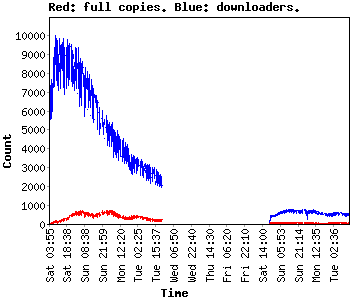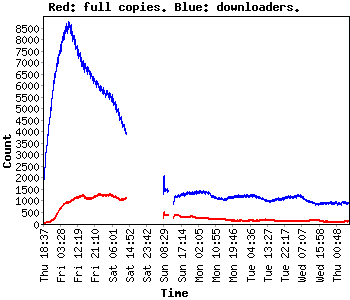|
I love BitTorrent. Not because
it lets me steal the w4rz0rz, but because it's a really great new
transport for large downloads. I've been impressed with Bram's
stewardship of the protocol and am glad to see he's
pursuing
commercial options.
But open source protocols in hackerland are fragile, there's a danger they fragment. And that seems to be happening with BitTorrent. I'm seeing torrents now with three kinds of tracking: the standard TCP tracker, UDP tracking, and trackerless. Which client works for all? I'd been wondering why my torrent downloads recently weren't working. I think the problem is that Debian testing installs bittorrent 3.4.2-4, which doesn't seem to work very well. The 4.0 .deb from bittorrent.com works better.
After surveying
BitTorrent
download traffic for Matrix: Revolutions last month I thought I'd
check out download traffic for a movie that
didn't suck.
 10,000 people grabbing a 2 gig file is a lot of video on demand. Still, crappy quality. The one sample I saw had decent sound and the picture didn't shake but the colour was all washed out. The cinematography in ROTK is so beautiful $9 is a bargain.
The Matrix: Revolutions had a complex worldwide simultaneous release,
ostensibly to fight
piracy.
Piracy happened anyway; 24 hours after the release, copies showed up
on the net for download. Badly compressed movies of shaky
camcorder copies. Pay the $9, folks.
Using the same /scrape URL that torrentspy uses, I tracked the BitTorrent activity of a 1.2G copy of the movie over the last week (from the day after movie release).   TorrentStorm is the latest good
Windows BitTorrent client. It's based on the
experimental client that
I
liked, but with lots of extra features.
Screenshots.
TorrentStorm is the latest good
Windows BitTorrent client. It's based on the
experimental client that
I
liked, but with lots of extra features.
Screenshots.
Good things it does:
 TorrentSpy is good
software to see what's going on in BitTorrent.
It shows the .torrent data in a nice GUI and
asks the tracker how many complete copies and
downloaders there are.
Nicer than my
BitTorrent
dumper.
TorrentSpy is good
software to see what's going on in BitTorrent.
It shows the .torrent data in a nice GUI and
asks the tracker how many complete copies and
downloaders there are.
Nicer than my
BitTorrent
dumper.
BitTorrent has a flaw; it's easy to get 99.9% of a file and never complete because no one has the last few bits. The main use of TorrentSpy is to see if any client has a full copy. Unfortunately it can't detect if the whole file is out there, but no one client has it all. With the average torrent having only 20-30 clients I guess that's unlikely.
Watching BitTorrent
penetrate
the game
demo market has given me an idea for a business model for
BitTorrent: charge companies for help hosting files via BitTorrent. It
could be a consulting business, teaching sites how to set up and
run trackers and seeds. Or it could be a service business, running
a BitTorrent hosting service for others. You could offer client
support, maybe custom-branded clients.
There may even be room for proprietary software
here: special trackers and monitoring tools.
I don't think any of this would be a huge business, but it'd be enough to fund BitTorrent development. Customers: anyone hosting downloads of more than 10 megs.
The BitTorrent
experimental download client is good. Installs with little
fuss, and when I click on a .torrent link it just works. Nice UI to
show you how the transfer is going with simple settings to throttle
upload bandwidth. If you're a Windows user and haven't used
BitTorrent, this is the place to start.
Game demos are starting to be distributed via BitTorrent. Perfect use: lots of enthusiasts, giant files (200 megs is common). Places to go for legitimate BitTorrent game files: GameTab, 3dgamers. Try out the cool Tron demo!
I used my BitTorrent
dumper to survey what was out there. What I
learned is that BitTorrent isn't a file sharing network, it's a transport.
Discovery and download initiation are still highly centralized.
Every shared file is managed by a single tracker host that plays
an active role helping find peers to download from. I
fear most .torrent files are short-lived.
I did a survey from three sites of dubious legality: torrentfiles.com, animetorrents.com, and torrents.co.uk. In 870 .torrent files I found 32 different trackers. The top 4 trackers accounted for 75% of all the files. Not a lot of diversity. Of course, my sample is biased. I was also interested in how folks use the BitTorrent metainfo. About 80% of all files use a piece length of 256k, followed in popularity by 512k and 1024k. I also found a bunch of unofficial tags: path.utf-8, creation date, comment, and md5sum. I'd like to do a more formal survey with a wider sample; this torrent search engine claims 8200+ files.
I was experimenting with BitTorrent, so I wrote a little
file dumper
to see what was in the mysterious .torrent files.
The code doesn't just parse
the
protocol; it'll dump whatever the decoder can find.
Sample output:
info length 41470132 piece length 262144 name Halo2_E3.wmv pieces [159 SHA-1 values] announce http://news.gametab.com:6969/announce But it's easy to criticize; BitTorrent is still awfully cool.
I finally tried out
BitTorrent,
Bram's
P2P file sharing app. The clever innovation in BitTorrent is that
it separates the search for files from the download of
files. Unlike KaZaA or Gnutella or whatever, BitTorrent only supports
file download, not search. You just use the web to find the
.torrent locator file you need for download, for instance
for the
Half Life 2
trailer.
BitTorrent is pregnant hackerware - it works great but is still poorly documented. And the apps aren't well integrated. Someone could build a killer tech company out of it. Some extra info is available in Brian's BitTorrent FAQ and the BitTorrent Wiki. Me, I started downloading by doing
apt-get install bittorrent
btdownloadcurses hl2_trailer.torrent |
||
